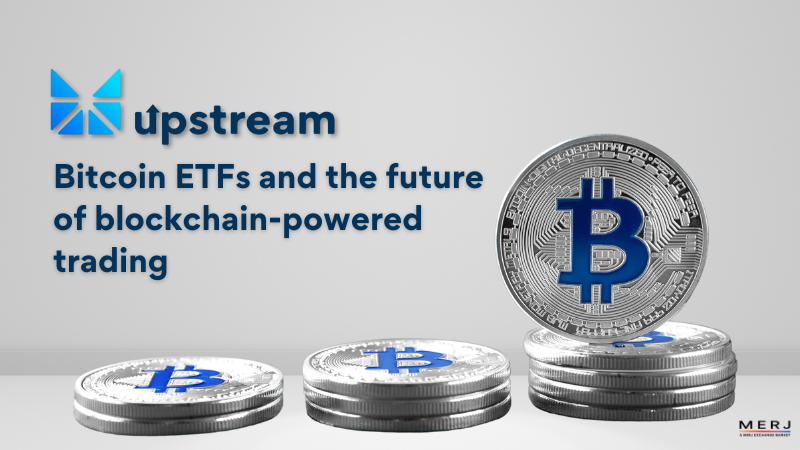Now accepting applications for Bitcoin ETFs to trade on Upstream’s next-generation retail trading app

By Fernanda De La Torre
The first Upstream Up Close episode of the year dropped today, this week’s focus, bitcoin ETFs!
Following the SEC’s recent approval of the first U.S.-listed bitcoin ETFs on January 10, 2024, aimed at tracking bitcoin’s performance, Upstream is excited to announce that we are accepting applications for bitcoin ETFs to list on our global market.¹
Spot bitcoin exchange-traded-funds (ETFs) are investment funds that track the price of bitcoin. These ETFs are traded on stock exchanges around the world, now including the U.S., allowing investors to gain exposure to bitcoin from their traditional brokerage accounts and without directly owning the cryptocurrency.
Upstream, a MERJ Exchange market, is not a cryptocurrency market and does not allow account funding via bitcoin or crypto trading. Upstream is a securities market and trading app powered by smart-contract technology.
How bitcoin ETFs work and how they are traded
When it comes to understanding how bitcoin ETFs work it’s important to note that there are two main types.
Spot-based ETFs: These are the real deal bitcoin holders. These ETFs directly invest in physical bitcoin, storing it in secure digital vaults, which registered custodians manage. The shares of these ETFs represent a claim to a slice of the fund corresponding to the number of bitcoin the fund is holding. As the price of bitcoin fluctuates, so does the value of the ETF shares. The goal is to offer investors a more straightforward way to gain exposure to bitcoin, but it may also introduce complexities like secure storage and regulatory hurdles.
Derivatives-based ETFs: Think of these as “borrowed bitcoins.” These ETFs don’t actually hold any bitcoin. Instead, they invest in bitcoin futures contracts. These are agreements to buy or sell bitcoin at a set price on a future date. By tracking the price movements of these contracts, the ETF mimics the performance of bitcoin, but with a twist. Because futures contracts can trade at a premium or discount to the actual bitcoin price, the ETF’s performance might not perfectly mirror the underlying asset.
When it comes to the way they’re traded it isn’t much different to regular stocks. Each bitcoin ETF is assigned a unique ticker symbol, which is used to identify and trade the ETF on the respective exchange its listed on.
Investors can use market orders or limit orders to trade bitcoin ETF shares. A market order is an instruction to buy or sell the ETF at the current market price, while a limit order allows investors to set a specific price at which they are willing to buy or sell.
To trade bitcoin ETFs, investors need to have brokerage accounts with platforms that support the trading of ETFs. These platforms can be online brokerage services or traditional brokerage firms.
Upstream accepting applications for bitcoin ETFs to trade
Spot bitcoin ETFs are currently incorporated in eight countries: Canada, Germany, Brazil, and Australia, along with Jersey, Switzerland, Liechtenstein, and Guernsey.² In the U.S., 6 of the ETFs are listed on the Chicago Board Options Exchange (CBOE), 3 on the New York Stock Exchange (NYSE), and 2 on Nasdaq.³
Upstream, a regulated MERJ exchange market and global trading app, is actively accepting applications for bitcoin ETFs to list which give applicants access to a global, digital-first investor base that can access their ETF shares from anywhere using a trading app.
Just as bitcoin ETFs aim to provide streamlined access to crypto for investors, Upstream strives to offer investors streamlined access to securities from exchanges worldwide.
Upstream is designed to remove the barriers typically involved when opening a digital wallet. Users can simply download Upstream, create a password, which in turn establishes a digital wallet on the backend. All blockchain technology and digital wallet creation occur under the hood.
Bitcoin ETFs are unlocking a whole new pool of investors. We believe Upstream can push that further, with its market being powered by the same technology that gives digital currencies their value.
This move for bitcoin ETFs to be made available on Upstream’s global market aligns with the values Bitcoin’s underlying technology promotes, including transparency, real-time trading, and non-custodial ownership. It also maintains the simplicity of traditional exchanges, featuring user-friendly onboarding, secure asset holding, and other investor protections.
Parties interested in listing a bitcoin ETF on Upstream can get started at: https://upstream.exchange/GetListed or reach the team at hello@upstream.exchange.
Sources
1 SEC | 2 CoinGecko | 3 TechCrunch
Disclaimers
U.S. persons may not deposit, buy, or sell securities on Upstream.
This communication shall not constitute an offer to sell securities or the solicitation of an offer to buy securities in any jurisdiction where such offer or solicitation is not permitted. NFTs have no royalties, equity ownership, or dividends. NFTs are for utility, collection, redemption, or display purposes only. Anyone may buy and sell NFTs on Upstream. All orders for sale are non-solicited by Upstream and a user’s decision to trade securities must be based on their own investment judgment.
Upstream is a MERJ Exchange market. MERJ Exchange is a licensed Securities Exchange, an affiliate of the World Federation of Exchanges, a National Numbering Agency, and a member of ANNA. MERJ is regulated in the Seychelles by the Financial Services Authority, https://fsaseychelles.sc/, an associate member of the International Association of Securities Commissions (IOSCO). MERJ supports global issuers of traditional and digital securities through the entire asset life cycle from issuance to trading, clearing, settlement, and registry. It operates a fair and transparent marketplace in line with international best practices and principles of operations of financial markets. Upstream does not endorse or recommend any public or private securities bought or sold on its app. Upstream does not offer investment advice or recommendations of any kind. All services offered by Upstream are intended for self-directed clients who make their own investment decisions without aid or assistance from Upstream. All customers are subject to the rules and regulations of their jurisdiction. By accessing the site or app, you agree to be bound by its terms of use and privacy policy. Company and security listings on Upstream are only suitable for investors who are familiar with and willing to accept the high risk associated with speculative investments, often in early and development-stage companies. U.S. persons may not deposit, buy, or sell securities on Upstream. There can be no assurance the valuation of any particular company’s securities is accurate or in agreement with the market or industry comparative valuations. Investors must be able to afford market volatility and afford the loss of their investment. Companies listed on Upstream are subject to significant ongoing corporate obligations including, but not limited to disclosure, filings, and notification requirements, as well as compliance with applicable quantitative and qualitative listing standards.
Forward-Looking Statements
This communication contains “forward-looking statements.” Such statements may be preceded by the words “intends,” “may,” “will,” “plans,” “expects,” “anticipates,” “projects,” “predicts,” “estimates,” “aims,” “believes,” “hopes,” “potential,” or similar words. Forward-looking statements are not guarantees of future performance, are based on certain assumptions, and are subject to various known and unknown risks and uncertainties, many of which are beyond the Company’s control, and cannot be predicted or quantified, and, consequently, actual results may differ materially from those expressed or implied by such forward-looking statements. Such risks and uncertainties include, without limitation, risks and uncertainties associated with (i) difficulties in obtaining financing on commercially reasonable terms; (ii) changes in the size and nature of our competition; (iii) loss of one or more key executives or brand ambassadors; and (iv) changes in legal or regulatory requirements in the markets in which we operate. The Company assumes no obligation to publicly update or revise its forward-looking statements as a result of new information, future events or otherwise.

